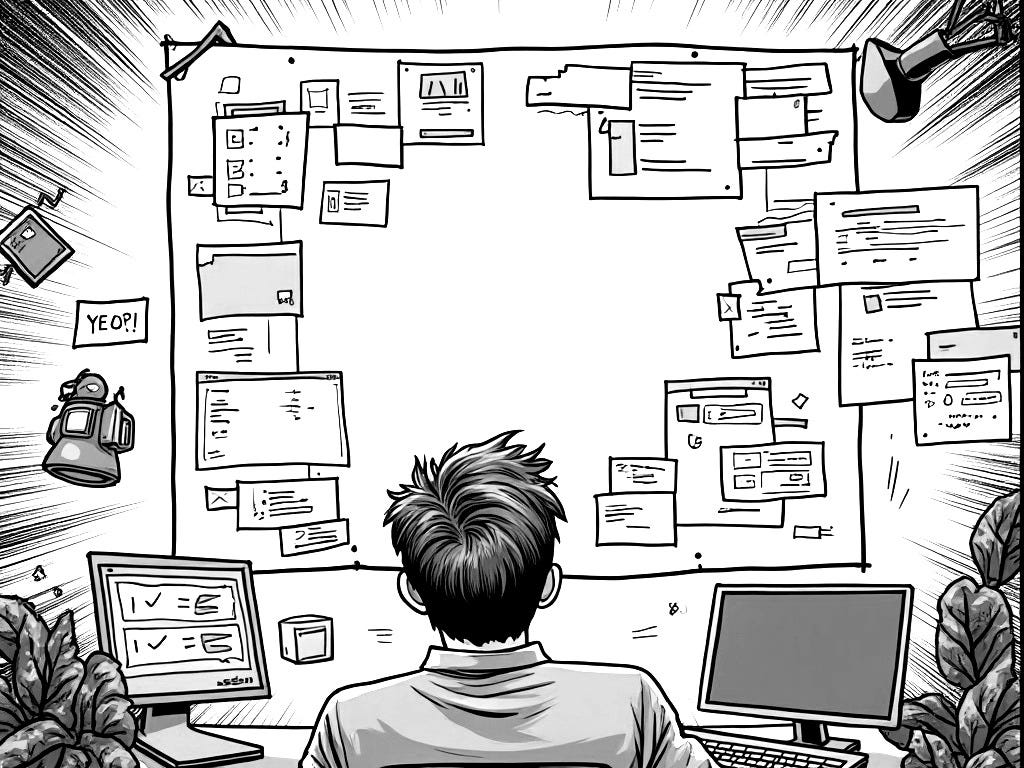The Problem-Finding Problem
An engineer's reality check: trading corporate problem-solving for the fuzzier world of finding a problem, building a solution, and then monetising the damned thing.
Several months ago, I left my comfortable software engineering job for what was originally intended to be a sabbatical. Well, almost everything a few things have changed.
If you’re looking for another “How I quit my job and made millions with this simple SaaS” story, you can stop reading now. This isn't that. This is a real-time account of what actually happens when you trade the structured world of corporate engineering for the much, much (much) less structured world of solo founding.
No growth hacks, no success-theatre, and definitely no courses teaching you how to sell courses about selling courses. My goal here is to work out a (repeatable) process to:
Identify problems worth solving.
Build the solutions.
Get the solutions into the hands of users.
Generate cashflow.
It’s going to be hard, but I think it’s also going to be pretty interesting. If all else fails, at least I tried and learnt a lot in the process.
Given this is the first edition, it’s probably worth providing some context about the current state of affairs and my observations so far …
The Accidental Escape
The plan was reasonably simple: Take a sabbatical. Learn Portuguese. Maybe build some side projects. Take some time to travel around with my new found free time. The reality? Within three months of leaving, I’d somehow acquired a CTO role I wasn’t even looking for, started a company in Portugal (an adventure in bureaucracy that deserves its own newsletter), and discovered that having unlimited freedom can be both energising and paralysing in equal measure.
Confessions of a Reformed Problem-Solver
The thing they don’t tell you about leaving a senior engineering role: Being good at solving problems doesn't help much when nobody’s giving you the actual problems to solve!
In corporate life, I was one of the "firefighter" types - the person you call when everything is on fire. Production outage? I’m going to be useful. Technical decision paralysis? I can help settle the discussion. War between management and engineering breaking out? I’ll dust off my diplomat’s cap. But now? I’m staring at a blank canvas wondering what the hell to paint.
Unsurprisingly, it turns out that finding the right problem to solve requires a very different skill set to solving the problem itself. And, whilst I love the technical activity of taking something from empty-whiteboard to stable-product, figuring out what product people actually want? That’s a whole new game.
The Content Creator Industrial Complex
Speaking of games, let’s talk about the elephant in the room: the endless parade of content creators selling the dream of digital entrepreneurship. You know the type - “Just create valuable content!” they say, from their perfectly lit home office (complete with a bookshelf creaking under the weight of its own pretentiousness)
The reality? Finding genuine market opportunities is hard. Marketing is harder. And don't get me started on distribution. It’s not that I think these skills are impossible to learn - they’re just not as straightforward as deploying a new micro-service - at least not to me.
What I'm Actually Doing About It
So far, I've:
Set up a proper company (Portuguese bureaucracy: 1, My Patience: 0).
Landed a part-time CTO role that keeps the lights on.
Built a small social media tool as a first dip-of-the-toe.
Created this newsletter to document the journey.
Going forward, I’m going to develop and (crucially) test frameworks for:
Finding problems worth solving (beyond the obvious “X but for Y” ideas).
Validating markets before writing all the code.
Building distribution from a modest budget and tiny social media presence.
Generating significant cashflow without going max-long Dogecoin.
What's Next
This newsletter will follow my attempts to crack this puzzle systematically. No success theatre, no pretence of expertise - just honest reflections and some frameworks, tools and processes for figuring it out.
Future dispatches will dive into:
A retrospective on my first product - what has gone well vs what hasn’t.
Systematic approaches and tools for finding market gaps.
Technical decisions that actually matter.
Marketing for people who'd rather be doing virtually anything else.
Most importantly, I’ll be designing, refining and testing everything I discuss in real-time, for myself. I have genuine “skin in the game” and if what’s written here doesn’t work, I’ll be the first to feel it.
So, if you’re a technical person trying to build something real, or think you’d derive value watching someone work through this systematically, you’re in the right place.
P.S. If this resonated, hit subscribe. No pressure - we both know there are already too many newsletters in your inbox. That being said, I think this one could turn out to be worth it.
Automation Consultancy ⚙️🚀
Codefield helps businesses build and implement automated solutions for an extremely wide range of challenges.
Regardless of sector or size, we find that there are many, many places where leveraging Automation and AI can help businesses reduce (or even eliminate) the time spent on repetitive and/or tedious tasks, allowing them to focus on the more valuable strategic work that takes the business forward.
If you think there are areas of your business that could be automated or streamlined, then feel free to reach out for a friendly (and in no way pushy) chat at automation@codefield.io




